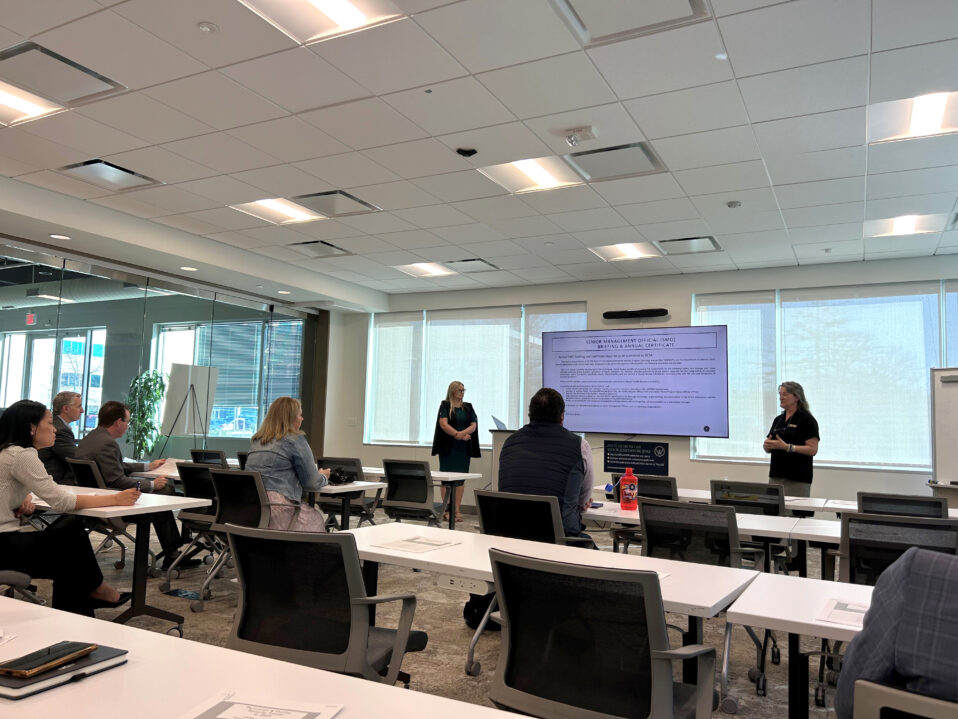 STEM Core – the intensive, personalized program that enables first-year college students to tackle calculus and pursue STEM careers – is expanding to two new colleges in the Fort Meade Region thanks to a $1.3-million grant from the National Science Foundation (NSF).
STEM Core – the intensive, personalized program that enables first-year college students to tackle calculus and pursue STEM careers – is expanding to two new colleges in the Fort Meade Region thanks to a $1.3-million grant from the National Science Foundation (NSF).
“A big part of our success in winning the grant was being able to show employer support for these pathways so we really credit the Fort Meade Alliance and some individual employers for helping us get this funding,” said Michael Venn, Assistant Dean of Mathematics at the Community College of Baltimore County (CCBC).
The grant will enable Anne Arundel Community College and Howard Community College to begin offering STEM Core to their students this year. It also establishes CCBC which just started its third year of STEM Core, as the East Coast hub for the program. CCBC will serve as “the first line of help” to AACC, HCC and other colleges as they stand up and evolve their own STEM Core programs.
STEM Core helps freshmen overcome the daunting – and sometimes career-altering – need for remedial math education and introductory calculus. The program was developed by Growth Sector, a California nonprofit dedicated to bringing together employers, community colleges, governments and foundations to create pathways to high wage jobs for disadvantaged Americans.
Simply the time and money it takes to complete remedial math courses and calculus preparation can derail some career plans, said Penny Cantwell, Chair of FMA’s Education and Workforce Development Committee. “By the time students complete the remedial work in the traditional manner to get into some STEM programs, they may be looking at five or six years in college. Some students just don’t have that time.”
The shock of starting a calculus course without full preparation derails other students.
“Calculus 1 is the make or break class for many students,” Venn said. “Some students change their mind about STEM careers when they get into Calculus 1.”
Three pillars of STEM Core help students overcome that challenge. Students are placed in a math cohort that provides intensive instruction, a study group and related instruction that shows the relevance of math to other subjects and careers.
A student support specialist closely follows and mentors each student, provides tutoring as needed, and connects students with important wrap-around services, including financial aid.
Finally, the student support specialist and industry partners provide students with career information, professional development services and hands-on experiences in STEM fields. This ranges from sessions on resume writing and classes with cyber professionals, to summer internships with STEM employers or “micro internships” – group projects lead by employers that task students to solve real-world STEM challenges.
Employer involvement has been key to establishing and evolving STEM Core, said David Gruber, a Director of Growth Sector. An infusion of industry knowledge has helped colleges finetune curricula and student counselling to better reflect industry realities. It has alerted many students to the reality that, despite the attractiveness of diplomas and certifications, most STEM employers need applicants to have a four-year degree. It has also convinced many students that they need to complete Calculus 1 even if their degree program doesn’t require it. That calculus credit, for example, convinces some employers that a student has the skills and potential to warrant an internship.
“We have seen some cyber majors complete calculus even though it wasn’t a requirement,” Venn said. “That is huge because we know cyber as a discipline is changing. The new cyber is a combination of computer science, cyber and IT, so these students are better prepared for that.”
Devoting time to STEM Core and creating internships, project-based learning activities and other work experiences is a good investment for employers, said Tim O’Ferrall, FMA General Manager. “What is really exciting about STEM Core is it increases the aperture of students that we get to talk to about these fields. By providing the accelerated math program, the wrap-around services and the experiences that show the relevance of college classes to careers, STEM Core expands the pool of students who can see themselves following a path to a STEM career.”



